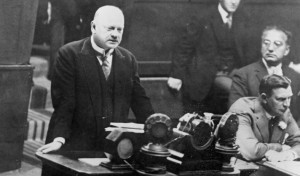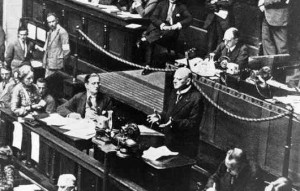Was xxxxxx a National Liberal?
In a new series of articles from contributors we will look at whether certain historical and perhaps contemporary figures were/are National Liberals? The first such article looks at Gustav Stresemann (German Chancellor and Foreign Minister in 1920’s). We would welcome comments on the article and any similar articles NL readers would like to contribute.
Was Gustav Stresemann a National Liberal? – André Bisson
Gustav Stresemann was a post-WW1 German Chancellor and Foreign Minister but who was he? Was he just another German politician floating around in post war 1920s Germany or someone who was much more than this? What did he stand for? These are just some of the questions I will try and answer as I uncover if Stresemann’s political leanings were to that of a National Liberal (in principle as apart from mere name).
 During his early life and student years Stresemann was a student of liberalism. He was also on the side of strident nationalism as was the norm of the day due to the existence of empire. This combination he wrote much about in his early writings and it would dominate his views for the rest of his life. When emerging onto the political arena in 1906 he showed himself as being to the left of the National Liberal spectrum. This became apparent by his support of expanded social-welfare programs that were viewed as folly at the time by conservative and elitist German military circles. When war broke out in 1914 despite a period of constraint and censorship Stresemann fought to stay in the Reichstag. Eventually in 1917 he succeeded in becoming the leader of the National Liberal Party.
During his early life and student years Stresemann was a student of liberalism. He was also on the side of strident nationalism as was the norm of the day due to the existence of empire. This combination he wrote much about in his early writings and it would dominate his views for the rest of his life. When emerging onto the political arena in 1906 he showed himself as being to the left of the National Liberal spectrum. This became apparent by his support of expanded social-welfare programs that were viewed as folly at the time by conservative and elitist German military circles. When war broke out in 1914 despite a period of constraint and censorship Stresemann fought to stay in the Reichstag. Eventually in 1917 he succeeded in becoming the leader of the National Liberal Party.
This party had existed since 1867 and was Centre-right on the political spectrum. In terms of the question, he definitely can be counted as one who supported the preservation of the nation state. He also recognised the importance of the family, community and nation as building blocks that construct a healthy and stable society. These qualities make him stand out as a National Liberal. However he also supported the monarchy which is hardly conducive to a policy of decentralising power to the lowest practical level? We may forgive him this due to the early crudeness of the National Liberal ideology. In addition this was the time that the major powers in Europe had monarchs, colonies and empires. It was the standard procedure to support the empire you were part of and this Stresemann did to the best of his abilities.
He also supported German expansionism, but he had no choice because war had broken out and most people understood that whoever lost would suffer immeasurable pains as a result of failure to achieve victory. He did however did support an end to the restrictive Prussian franchise which shows his support for greater democracy and after the war he tried to support pure representative democracy seeing it as Germany’s only hope.
Although initially sceptical of the new Republic, out of all the German politicians he was one who really wanted to make Germany’s post-war democracy work and create a stable state. Stresemann formed the German Peoples Party (DVP) and promoted Christian family values, secular education, lower tariffs, opposition to welfare spending and agrarian subsides. Some of these could be seen in line with the earlier National Liberal agenda but it seems Stresemann was trying to find the cuts needed to pay the debt dictated by Versailles. In essence he responded to the situation because he knew that if the allies invaded Germany and took what they wanted by force Germany would never retain any self-governance. He was protecting Germany’s status as a nation state.
(Originally he joined the newly formed German Democratic Party (DDP) in 1918 but was rejected given his previous ‘annexationist’ views and formed the DVP the following year. The old National Liberal activists basically joined either of the new Liberal parties; the ‘left-wing’ DDP or ‘right-wing’ DVP. Ironically, given his pragmatic policies on the ‘national’ questions and reformist background, Stresemann might have been more suited to the DDP. On more than one occasion the two parties tried to come closer than their parliamentary co-operation but certain policy differences or ‘prejudices’ prevented it happening e.g. anti-Semitism (which Stresemann rejected), big business interests etc. Stresemann would have been the ideal leader of a new unified ‘National Liberal’ party. Indeed their failure to create a ‘Grand Coalition of the Centre’ however organised, was an important factor in why the extremes grew and is one reason why the NLP in the UK is supporting such a development via the People’s Alliance (UK) – ED)
Although still a monarchist at heart, Stresemann eventually moved to cooperation with the centre and left parties to help democracy move along. From the 1920s onwards Stresemann became an ever more powerful figure. Eventually he became the Chancellor for a period and helped to ease relationships with the other European powers by calling off strikes in the Ruhr where the French had invaded. He also changed the currency and solved some of Germany’s economic problems in the process.
 Stresemann saw the threat of foreign occupation and in keeping with National Liberal ideology fought for self determination at every turn. As he wrote to the Crown Prince on 23 July 1923: “The most important objective of German politics is the liberation of German territory from foreign occupation. First, we must remove the strangler from our throat”. He saw this as the Reparations.
Stresemann saw the threat of foreign occupation and in keeping with National Liberal ideology fought for self determination at every turn. As he wrote to the Crown Prince on 23 July 1923: “The most important objective of German politics is the liberation of German territory from foreign occupation. First, we must remove the strangler from our throat”. He saw this as the Reparations.
Even after the coalition government fell apart a new one was formed with him as foreign minister where he tried to secure Germany’s economic independence through the Dawes plan of 1924 and Young plan in 1929 trying to limit war reparations. Other politicians were either powerless or hankering for (a disastrous) war. His courage in an atmosphere of helplessness or belligerence is to be admired. It was Germany’s loss when he died suddenly in 1929.
‘Stresemann was an interesting figure. He was a member of the pre-1WW German National Liberal party and a pacifist ‘nationalist’ afterwards. He was economically brilliant. Nevertheless it could be predicted that if he had not died prematurely we might possibly have seen a resurgent Germany that wouldn’t have fallen prey to extremes and of course dictatorship and war.’ – Graham Williamson (NLP (UK))
In conclusion I believe Stresemann can be seen to be a National Liberal from the evidence stated. He supported his nation and defended it when countries tried to rip Germany apart. He also promoted self-determination and fought to maintain liberty, independence and democracy (in a country more at ease with authoritarianism) through peaceful negotiations and constructive agreements. Overall he is a symbol of what one man can do if he has the ideas and the motivation to see those ideas through.
Date: December 26, 2010
Categories: Articles











